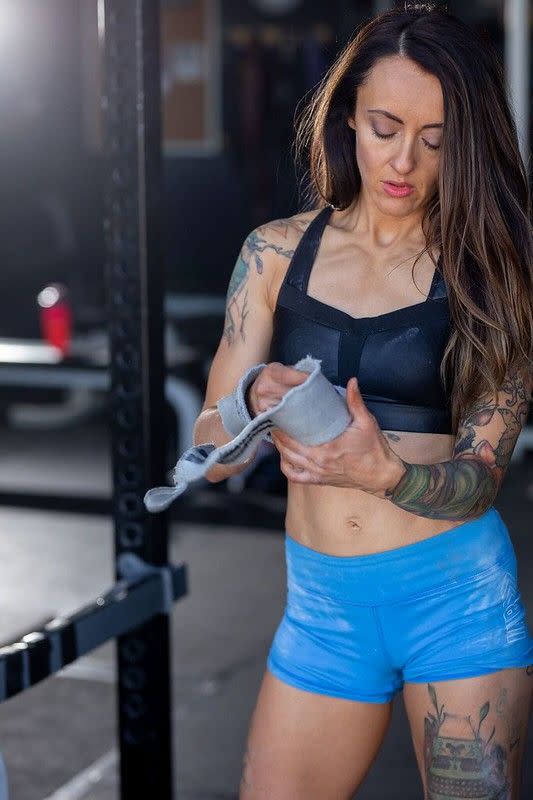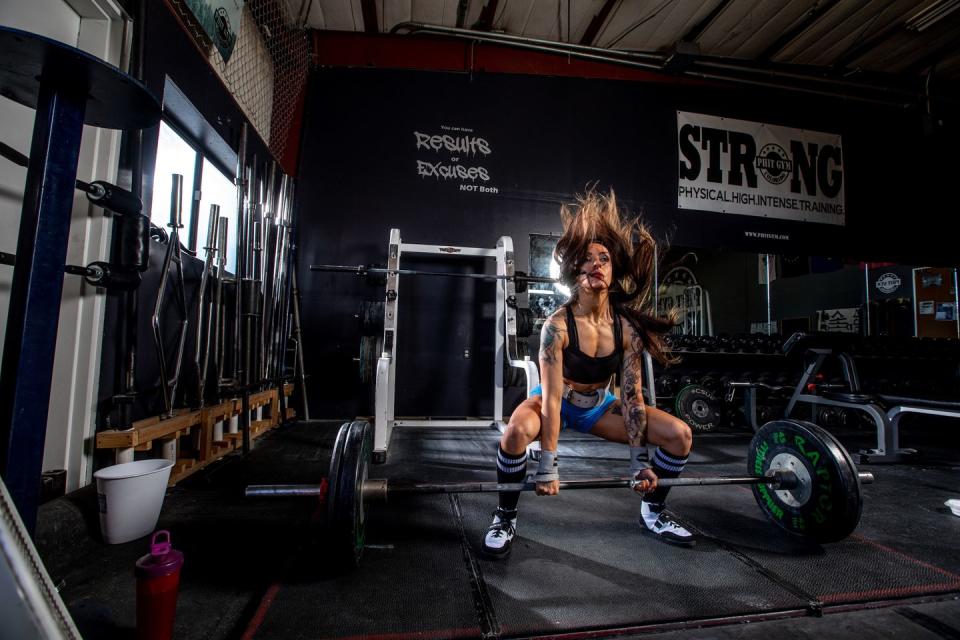Powerlifting Changed My Relationship With My Body

I take a deep breath as I look around the warm-up area at the Mr. Olympia Pro Powerlifting Competition in Las Vegas. Well, actually, I look up—because everyone around is about a foot taller than me. I can almost hear the "Sesame Street" song teasing: "One of these things is not like the other."
I’m the smallest powerlifting competitor by 40 pounds. I’ve never been an athlete (I used to hide in the locker room during gym class), and I’ve never competed in a sport before. I’m a 40-year-old mom and legally blind book nerd. I clearly don’t fit in.
And I’ve never felt more at home.
On the surface, it doesn’t make sense that I'm competing for a world record in powerlifting, a strength sport that measures your maximum single lift of the squat, bench press, and deadlift. But below the surface, this is exactly what I’ve needed all my life to heal my past, escape the social constructs that have haunted me, and re-find my true self.
Holy heck, I am terrified.
Deep breath. I remind myself why I am chasing that fear: Heavy weight has given me myself back. My power.
Women are constantly told to shrink, take up less space, diet, be quiet, be smaller, smaller, smaller, smaller. Cut it off, suck it out, don't get bulky, be a lady, cross your legs, shh, lift to “tone” (if you must) but don't get “too big.”

Powerlifting defies this. It demands you take up space and grow. It measures your strength, not your weight or fat percentage. It encourages women to be bigger—and not just physically. The barbell doesn’t care how sexy you are, or if you have stanky armpits, scars or untamed hair (check, check, check). You can either lift the weight or you can’t. And you can’t get stronger without confronting discomfort and failure upon failure. So many lessons, and they all extend beyond the platform.
Everywhere I turn, other women echo this.
“I started powerlifting during a dark period in my life,” says Christina Leonatti, who’s at the Olympia to pursue bench press records. “I wasn’t sure why I needed it so bad, or what I was trying to prove. But ultimately, it didn’t matter. Lifting gave me hope and eased my suicidal thoughts. It became my therapy.”
Leonatti’s not just in Vegas for herself. She’s also raising money for Pull Your Heart Out, a nonprofit she founded to pay for other women’s gym memberships and competition fees. The money raised today will sponsor two young women (in a family of eight kids) who just lost their mother in a motorcycle accident.
“Lifting, to many of us, is our grounding. It saves us from depression, anger, and complacency. The iron is a reason to live and a reason to keep going,” Leonatti says.
The barbell is healing me, too. I have suffered multiple abdominal traumas and even clinically died due to blood loss, but I have fought my way back to life and to health. I am also a survivor of domestic violence. As a naturally small woman, my size has been used as a weapon against me—to shrink me and terrorize me.
I am the weapon now, I remind myself as I tighten my belt. Today, I take it all back on the platform. I will not be small anymore. We will not be small anymore.
I am a symbol of a growing trend of women sick of shrinking.
Powerlifting among women is surging. USA Powerlifting has seen a boom in female membership from 21 to 35 percent between 2011 and 2018, and there are increasingly more powerlifting training programs specifically for women, like Colorado-based Corvis Strength Co.
Worldwide, the increase is even bigger. Powerlifting meets have nearly doubled in participation between 2014 and 2018, from about 59,000 competitive lifters to more than 101,000, according to the OpenPowerlifting project, which tracks global powerlifting data. In that time, the number of women competing in powerlifting has nearly doubled. Men’s rate of growth hasn’t kept up.
A post shared by USA Powerlifting® (USAPL) (@usapowerlifting) on Jan 29, 2018 at 2:57pm PST
Needless to say, the gap between men and women is quickly closing. In 2014, only about a quarter of competitive powerlifters were women. Today, one third are.
There is a growing shift in society's perception of what it means to be a woman, and the sudden surge of powerlifting is a natural expression of this change. You can see the evolution on social media, in things like the Instagram page you.look.like.a.man, which makes sarcastic memes out of things people say to female athletes. If you’re going to lift that much weight, you need to smile while you do it. Aren’t you afraid of getting bigger? Just don’t get to be too much.
Women are now speaking up about things they used to hide in shame and seeking out things that used to be "for men." And then rising to the top of those things. As of fall 2019, the top five best powerlifters, according to the Wilks Calculator—a coefficient used to measure powerlifters’ strength, despite size—was not some giant Russian man with a “power belly.” They were all women.
Stacy “Bama” Burr hit No. 1 in March of 2019. When she began powerlifting in 2014, she says it felt like a different era. Back then, she says she was kicked out of a gym for being too loud.
“People laughed at me and picked on me because I was a girl and I was too raw and too aggressive,” she says.
Today, people pay Burr to visit gyms around the country to be her too-much self. She is a motivational speaker, a coach and runs a podcast, The Champion Mindset.
A post shared by Stacy Burr (@bamaburr) on Jan 20, 2020 at 6:42am PST
Behind the stage at the Olympia, I’m on my last warm-up set. I catch Leonatti’s eye, and I remember what she said a few nights ago when I told her I felt like an imposter: Outcast is just another word for trailblazer. Whenever you feel like you don’t fit in, that’s an honor, because it means you are doing something different.
Burr calls it a “new era of femininity.”
“It’s whatever roles we want to create,” she says. “Femininity now is so raw and powerful and everything and nothing all at the same time. What is feminine? I don’t think it exists anymore. This has not dulled down what it means to be a woman. It has expanded it.”
I hear the announcer call my name and the world goes blank. It’s just me and the barbell. For a moment, my initial motivation runs through my veins: the desire to unwrite my past and feel free of society’s expectations. But that dissolves and leaves me with only this moment. Hands on the cold bar. Inhale and brace. Three white lights.

I get that world record, for the deadlift in my age and weight class. But I also get something much more.
The satisfying weight in my hands drains all thoughts from my mind, and with them all past and all future. It’s like the most bizarre, shaking, sweaty, chalk-covered meditation. I feel my power, and it feels like me. No words, no labels.
Just me. My own un-definition of femininity.
For more ways to live your best life plus all things Oprah, sign up for our newsletter!

